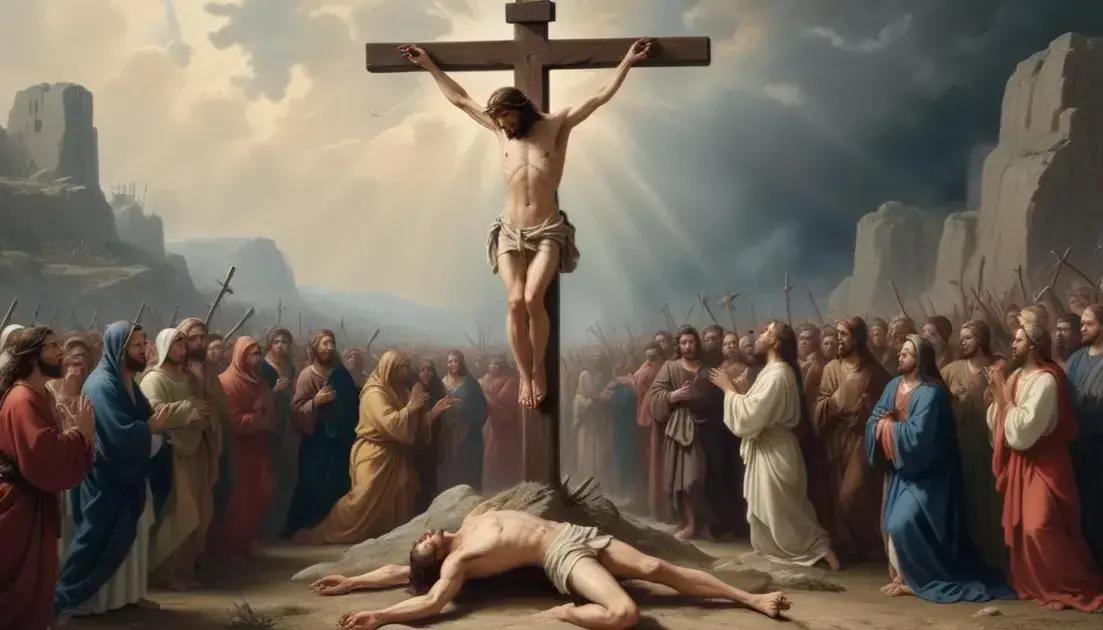
The Crucifixion of Jesus: Milestone of Christianity
The Crucifixion of Jesus is a pivotal event in Christianity that profoundly influenced early believers and shaped the church’s growth. It symbolizes sacrifice and redemption, emphasizing love and forgiveness. Jesus’ Crucifixion led to the spread of his teachings and the formation of close-knit Christian communities that thrived despite facing persecution. The theological implications of this event, particularly the concepts of atonement and hope, continue to resonate today, illustrating the lasting impact of this moment on faith and culture worldwide.
Understanding the Crucifixion of Jesus is crucial for grasping the foundations of Christianity. This pivotal event shaped beliefs and sparked movements, inviting exploration.
The Context of the Crucifixion
The context of the Crucifixion of Jesus is crucial for understanding its significance. This event didn’t happen in a vacuum. It took place in ancient Judea, a region under Roman rule. Many people struggled with their faith during this tricky time.
Political Climate
The Romans controlled Judea with an iron fist. They enforced strict laws and often crushed any form of rebellion. Jesus’ teachings challenged the status quo. His message of love and forgiveness stood in stark contrast to the harshness of the times.
Religious Tensions
Religious leaders felt threatened by Jesus. They saw his growing popularity as a direct challenge to their authority. The tension between Jesus and the religious leaders added pressure. This hostility played a major role in the events leading up to the Crucifixion.
The Role of Followers
Jesus had many followers who believed in his message. They relied on his teachings for hope and guidance. However, not everyone agreed. Some followers abandoned him when things got tough. This shows how challenging faith can be.
Events unfolded quickly on the night of the Crucifixion. Betrayal and fear led to Jesus’ arrest. These factors paint a grim picture but highlight why this moment is so pivotal in Christian faith.
Historical Significance
The historical significance of the Crucifixion is immense. It changed the course of history in many ways. Jesus’ death is more than just an event; it’s a turning point for faith and values worldwide.
Foundation of Christianity
The Crucifixion is often seen as the birth of Christianity. It marks the moment when Jesus made the ultimate sacrifice for humanity. This act of love sparked a movement that spread across the globe.
Impact on Religious Beliefs
This event reshaped religious beliefs everywhere. Followers began to see Jesus as the Savior. His death and later resurrection gave hope to many. This message of redemption continues to inspire countless lives.
Influence on Culture
Art, literature, and music have reflected the significance of the Crucifixion. Artists have depicted this poignant moment for centuries. These creative works help keep the story alive in public consciousness.
Furthermore, the event raised important questions about justice, sacrifice, and forgiveness. These concepts are discussed in many cultures and societies today. The lessons drawn from Jesus’ Crucifixion still resonate strongly.
Theological Implications
The theological implications of the Crucifixion are profound. This event shapes how many people understand faith in God. It raises important questions about sacrifice, love, and redemption.
Concept of Atonement
One key idea is atonement. Many believe that Jesus died for our sins. This means his sacrifice bridges the gap between humanity and God. By accepting Jesus, believers can feel forgiven and whole again.
Understanding Sacrifice
The Crucifixion shows what true sacrifice looks like. Jesus gave everything for others, teaching the importance of putting others first. This act of love is central to Christian teachings.
Hope and Resurrection
Another important implication is hope. The resurrection following the Crucifixion gives believers hope beyond death. It promises eternal life and inspires faith even in tough times.
These theological implications encourage followers to seek a deeper relationship with God. They shape how many see justice, mercy, and love in their own lives. The message of the Crucifixion continues to inspire millions around the world.
Impact on Early Christianity
The impact on early Christianity of the Crucifixion was significant. After Jesus’ death, his followers faced tough challenges. They had to carry on his message and keep hope alive.
Growth of the Movement
Following the Crucifixion, early Christians spread Jesus’ teachings. They traveled to different towns and cities to share the good news. Many people were drawn to the message of love and forgiveness.
Community Formation
Believers formed tight-knit communities. They gathered to pray, share meals, and support each other. These early Christian communities were known for their kindness and charity.
Persecution and Resilience
Despite facing persecution, early Christians remained resilient. They often faced danger because of their faith. Many chose to stand strong in their beliefs, believing in the significance of Jesus’ sacrifice.
As time went on, the teachings of Jesus influenced the world. The early followers helped shape Christianity into a major religion. Their dedication helped establish practices and beliefs that continue today.
Conclusion
In conclusion, the Crucifixion of Jesus remains a vital moment in history. Its impact on early Christianity was profound, shaping beliefs and communities that spread across the world. The teachings of Jesus continue to inspire millions today.
From the understanding of sacrifice and redemption to the creation of strong communities, these lessons have shaped how many live their lives. The courage of early Christians to keep faith alive during tough times reflects the strength of their beliefs.
Remembering the significance of the Crucifixion helps us appreciate the foundations of Christianity. It reminds us of the power of love and forgiveness that continues to resonate with people everywhere.


